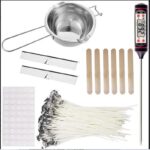Are you considering starting a candle making business in the UK? You may be wondering, “Is candle making profitable in the UK?” The growing trend of handmade candles has sparked interest among many aspiring entrepreneurs. In this article, we will explore the profitability of candle making in the UK and provide valuable insights for those looking to enter this industry.
As the demand for unique and artisanal products continues to rise, so does the popularity of handmade candles. From scented soy candles to decorative beeswax options, there is a diverse market for individuals interested in creating their own line of candles. Whether you have a passion for crafting or are intrigued by the potential profits, understanding the ins and outs of candle making is crucial for success.
In this section, we will delve into various aspects of candle making to provide you with a comprehensive understanding of the industry. From exploring the art and process of candle making to analyzing market research and potential profits, we will guide you through everything you need to know before embarking on your entrepreneurial journey in the UK’s candle making industry.
The Art of Candle Making
Candle making has become an increasingly popular hobby and business venture in the UK. Understanding the process and materials needed for candle making is essential for those looking to enter this industry. The art of candle making involves several steps, starting with gathering the necessary supplies such as wax, wicks, fragrance oils, and dyes. The next step is melting the wax and adding any desired scents and colors before pouring it into a mold or container with a wick.
One of the most popular types of wax used is soy wax, known for its clean burn and eco-friendly properties. Paraffin wax is another common choice due to its affordability and ability to hold fragrances well. Beeswax is also favored for its natural and sustainable qualities, although it can be more expensive. In terms of wicks, cotton wicks are widely used because they burn cleanly and consistently.
When it comes to fragrances and colors, there are countless options available to suit different preferences and styles. From floral scents to fruity aromas, candle makers have a wide range of choices to create unique products that stand out in the market.
Finally, understanding the safety precautions involved in candle making is crucial as working with hot wax can pose potential hazards. Using proper equipment such as a double boiler for melting wax and ensuring good ventilation in the workspace are important safety measures to consider.
Given all these factors, it’s clear that entering into the world of candle making requires careful consideration of materials and processes involved.
| Candle Making Material | Common Choices |
|---|---|
| Wax | Soy Wax, Paraffin Wax, Beeswax |
| Wicks | Cotton Wicks |
| Fragrances & Colors | Various scents & color options available |
Market Research
In recent years, the demand for handmade candles in the UK has seen a significant increase. Consumers are increasingly seeking unique and artisanal products, including candles, to add ambiance and personality to their homes. This growing interest in handmade candles presents a lucrative opportunity for entrepreneurs looking to enter the candle making industry. According to market research, the UK candle market is expected to continue expanding, creating a promising landscape for those interested in starting a candle making business.
One of the driving factors behind the increased demand for handmade candles is the shift towards sustainable and eco-friendly products. Consumers are becoming more conscious of the environmental impact of mass-produced goods and are turning to locally made, natural alternatives.
Handmade candles fit into this trend as they can be crafted using sustainable materials such as soy wax or beeswax. Additionally, consumers appreciate the craftsmanship and individuality that come with handmade candles, further fueling the demand for these products.
Furthermore, there is a growing preference among consumers for supporting small businesses and independent artisans. This has led to an increase in demand for locally made products across various industries, including home decor and lifestyle items like candles. As a result, there is a niche market within the UK for handmade candles that offers potential profitability for aspiring candle makers.
| Handmade Candle Market | Market Trends |
|---|---|
| Increasing demand | Shift towards sustainable and eco-friendly products |
| Niche market within the UK | Growing preference for supporting small businesses |
Cost Analysis
Candle making is not only a hobby but also a profitable business venture in the UK. However, before diving into this industry, it is crucial to understand the financial aspects involved. This section will break down the expenses and potential profits, providing a clearer picture of the cost analysis for candle making.
When starting a candle making business, the initial investment will include raw materials such as wax, wicks, fragrance oils, and containers. Additionally, equipment such as melting pots, thermometers, and scales will be necessary to produce high-quality candles. These expenses can vary depending on the scale of production and the quality of materials used. It is essential to carefully budget for these costs to ensure that the business remains financially sustainable.
On the flip side, potential profits from candle making can be substantial. With the increasing demand for handmade and artisanal products in the UK, there is a lucrative market for quality candles. By setting competitive prices and effectively marketing the unique selling points of your candles, it is possible to generate a significant income from this craft. Furthermore, building a loyal customer base through excellent product quality and customer service can lead to repeat sales and word-of-mouth referrals.
In summary, while there are initial expenses to consider when venturing into candle making as a business in the UK, there is undeniable potential for substantial profits. By carefully analyzing costs and strategically pricing products to meet market demand, candle making can indeed be a profitable endeavor in the UK’s growing artisanal industry market.
Tips for Success
Identifying Your Target Market
Before diving into the business of candle making, it’s essential to identify your target market. Understanding who your potential customers are will help you tailor your products and marketing strategies accordingly. In the UK, there is a growing trend for eco-friendly and sustainable products, so targeting environmentally conscious consumers can be a profitable approach. Additionally, candles are often purchased as gifts, so considering the gifting market is also crucial for success.
Building an Online Presence
In today’s digital age, having a strong online presence is key to reaching a wider audience. Utilize social media platforms such as Instagram and Facebook to showcase your handmade candles and engage with potential customers. Setting up an e-commerce website where customers can easily place orders is also essential. Creating visually appealing content and utilizing targeted advertising can help boost sales and increase brand awareness.
Collaborating With Local Retailers
Partnering with local retailers can provide an additional avenue for selling your handmade candles. Approach boutique shops or gift stores that align with your brand’s aesthetic and values. Offering consignment or wholesale partnerships can allow you to reach customers who prefer to shop in-person rather than online. Building strong relationships with retailers can lead to long-term success in the competitive candle market in the UK.
By implementing these strategies for marketing and selling handmade candles in the UK, you have the potential to create a profitable venture in the candle making industry.
Legal Considerations
When it comes to selling candles in the UK, there are a number of legal considerations that need to be taken into account. Understanding the regulations and requirements for selling candles is crucial to ensure that you are operating within the law and meeting all necessary standards. Here are some key points to consider:
- Safety Standards: Candles sold in the UK must meet certain safety standards to ensure that they do not pose a risk to consumers. This includes considerations such as the materials used, the stability of the candle, and warning labels for potential hazards.
- Product Labeling: Proper labeling is essential when selling candles in the UK. This includes clearly stating any potential allergens or irritants, as well as providing information on how to safely use the candle.
- Registration and Compliance: Depending on the scale of your candle making business, you may need to register with local authorities or comply with specific regulations relating to manufacturing and selling products.
It is important to do thorough research on the legal requirements for selling candles in the UK, as non-compliance can result in fines or even legal action. By understanding and adhering to these regulations, you can ensure that your candle making business operates legally and ethically.
Additionally, it is advisable to consider obtaining product liability insurance for your handmade candle business. This can provide protection in case of any legal claims related to the safety or quality of your products. Taking these legal considerations seriously is essential for anyone looking to enter or expand their presence in the profitable UK candle making industry.
Success Stories
The UK has seen a surge in the popularity of handmade candles in recent years, with many individuals turning their passion for candle making into successful businesses. In this section, we will explore the success stories of some of the most prominent candle makers in the UK and gain insight into what has contributed to their profitability.
Interview With Jane Smith, Founder of Fragrant Flames
Jane Smith, the founder of Fragrant Flames, a popular handmade candle brand in the UK, attributes her success to the quality of her products and unique fragrances. She emphasizes the importance of using high-quality materials and paying attention to detail in every aspect of the candle making process. Jane also highlights the significance of building a strong online presence through social media and e-commerce platforms, which has significantly contributed to her profitability.
Spotlight on Tom Johnson, Owner of EcoLuxe Candles
Tom Johnson, the owner of EcoLuxe Candles, has found great success by capitalizing on the growing demand for eco-friendly and sustainable products. He prioritizes using natural and environmentally friendly ingredients in his candles, resonating with an increasingly conscientious consumer base. Tom also underscores the value of collaborating with local artisans and suppliers to further enhance his brand’s appeal.
Insights From Sarah Brown, Creator of Serenity Scents
Sarah Brown, the creator of Serenity Scents, believes that personalized customer service is one of the key factors behind her profitable candle making business. By offering bespoke candle designs and scents tailored to individual preferences, she has been able to build a loyal customer following. Sarah also stresses the significance of participating in local craft fairs and markets to connect directly with consumers and gather feedback.
These success stories demonstrate that with creativity, dedication, and strategic business practices, candle making can indeed be profitable in the UK market. Aspiring entrepreneurs can draw inspiration from these industry leaders as they navigate their own journey towards establishing successful handmade candle businesses.
Conclusion
In conclusion, it is evident that the candle making industry in the UK holds great potential for profitability. With the growing demand for handmade, artisanal products, there is a significant market for high-quality, unique candles. Market research has shown an increasing interest in natural and sustainable products, creating a niche for handmade candles that utilize environmentally friendly materials.
By understanding the costs involved and potential profits of candle making, entrepreneurs can make informed decisions on how to best invest their time and resources. While there are initial expenses to consider, such as purchasing materials and equipment, the relatively low overhead costs make this business venture accessible to many individuals. Additionally, with the right marketing strategies and a strong online presence, handmade candle makers can reach a wide audience and establish a loyal customer base.
Legal considerations should not be overlooked when venturing into candle making as a business. Understanding the regulations and requirements for selling candles in the UK is crucial to avoid any legal repercussions. By taking these factors into account and thoroughly researching the industry, aspiring candle makers can position themselves for success in this profitable market. Overall, with dedication, creativity, and attention to detail, it is clear that candle making can indeed be profitable in the UK.
Frequently Asked Questions
Do Candle Makers Make a Lot of Money?
The income of a candle maker can vary widely depending on factors such as the quality and uniqueness of their products, marketing efforts, and the size of their customer base. Some candle makers do make a good living from their craft, especially those who have developed a strong brand and customer following.
Are Candles in High Demand?
Candles are indeed in high demand, especially for use in home décor, aromatherapy, and relaxation purposes. With the increased focus on self-care and creating cozy atmospheres at home, there is a steady demand for various types of candles in the market.
Do I Need a License to Sell Candles UK?
In the UK, if you want to sell candles as a business, you may need to obtain certain licenses or permits depending on the scale of your operations. This could include registering with your local council or obtaining certification for specific types of candles such as those made from natural materials.
It’s important to research and understand the legal requirements before selling candles within the UK.

Welcome to my candle making blog! In this blog, I will be sharing my tips and tricks for making candles. I will also be sharing some of my favorite recipes.





